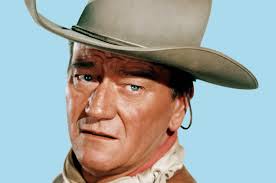
Image courtesy: Facts.Net
John Wayne : The Duke
John Wayne, born Marion Robert Morrison, was an iconic American actor whose career spanned over five decades. Known for his rugged good looks, distinctive voice, and commanding presence, Wayne became a symbol of American masculinity and patriotism. In this blog post, we will take a closer look at the life and legacy of this legendary actor.
John Wayne was born on May 26, 1907, in Winterset, Iowa. Growing up, he had a strong interest in sports and attended the University of Southern California on a football scholarship. However, a career-ending injury led him to pursue acting
Wayne’s first major film role came in 1930, when he starred in The Big Trail. Although the film was not a commercial success, it helped him establish a foothold in Hollywood. Throughout the 1930s, Wayne appeared in a variety of B-movies and Westerns, gradually building his reputation as a reliable actor.
It was in the 1940s that Wayne’s career truly took off. He starred in several critically acclaimed films, including Stagecoach (1939), Red River (1948), and The Searchers (1956). His collaboration with director John Ford was particularly fruitful, and the two went on to make many successful films together.
John Wayne’s most iconic roles were often in Westerns, where he portrayed rugged, morally upright heroes. His portrayal of characters like Rooster Cogburn in True Grit (1969) and Ethan Edwards in The Searchers (1956) solidified his status as a Hollywood legend.
Despite his popularity, Wayne was not always recognized by the Academy Awards. It wasn’t until 1969 that he won his first and only Oscar for his role in True Grit. However, he did receive numerous other awards and honors throughout his career, including the Presidential Medal of Freedom in 1980.
John Wayne’s impact on American cinema and popular culture cannot be overstated. He became a symbol of the American West and embodied the values of rugged individualism, bravery, and loyalty.
Wayne’s influence extended beyond his acting career. He was also involved in politics and was a staunch conservative. His support for conservative causes and his patriotic image made him a divisive figure in some circles, but he remained beloved by many.
Even after his death in 1979, John Wayne’s legacy lives on. He is often cited as one of the greatest actors in the history of American cinema. His films continue to be watched and appreciated, and his impact on the film industry is undeniable. lets take look at some of his great movies.
Stagecoach (1939)
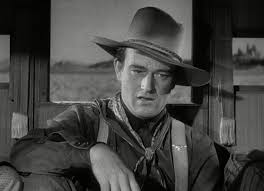
Image courtesy: The Mindreels
Directed by John Ford,” Stagecoach” is frequently considered the film that propelled John Wayne to stardom. In this Western masterpiece, Wayne plays the part of Ringo Kid, an outlaw seeking vengeance. The film not only showcased Wayne’s amusement chops but also established numerous of the Western kidney’s conventions that would be imitated for times to come.
True Grit (1969)
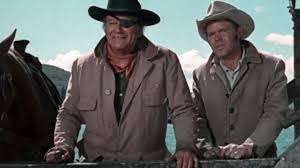
Image courtesy: Ridgway Colorado
maybe one of John Wayne’s most iconic places, for which he won an Academy Award for Stylish Actor. In this film, Wayne portrays Rooster Cogburn, a tough and grizzledU.S. Marshal hired by a youthful girl to track down her father’s killer. Wayne’s performance in this movie is important and memorable, showcasing his capability to bring depth and complexity to his characters.
The Quest (1956)
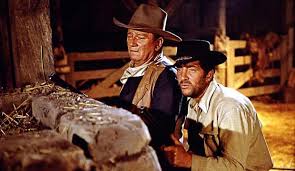
Image courtesy: Gold Derby
Directed by John Ford,” The quest” is extensively regarded as one of the topmost Westerns ever made. In this film, Wayne plays the part of Ethan Edwards, a Civil War stager on a charge to deliver his bastard, who has been kidnapped by Native Americans. Wayne’s depiction of Ethan Edwards is both haunting and complex, showcasing his range as an actor.
The Quiet Man (1952)
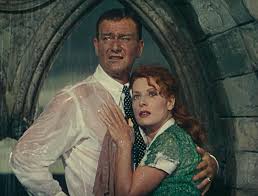
Image courtesy: Bright Wall/Dark Room
While John Wayne is primarily known for his Western places,” The Quiet Man” showcases his versatility as an actor. Directed by John Ford, this romantic drama tells the story of an American prizefighter who returns to his Irish roots and falls in love with a original woman. Wayne’s performance in this film is tender and sincere, revealing a different side to his on- screen persona.
Rio Bravo (1959)
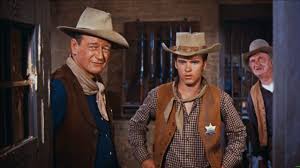
Image courtesy: Medium
” Rio Bravo” is a classic Western film directed by Howard jingoists. In this movie, Wayne plays the part of Sheriff JohnT. Chance, who must defend a small city against a important horsewoman and his gang. The film is known for its sharp dialogue, memorable characters, and thrilling action sequences, with Wayne delivering a strong and attractive performance.
Red River (1948)
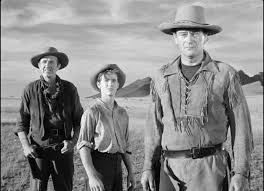
Image courtesy: DVD Beaver
In” Red River,” John Wayne portrays Thomas Dunson, a horsewoman who embarks on a dangerous cattle drive. Directed by Howard jingoists, this film is an grand Western that explores themes of fidelity, family, and the harsh realities of the American frontier. Wayne’s performance in this movie is violent and commanding, landing the substance of the rugged buckaroo archetype.
The Man Who Shot Liberty Valance (1962)
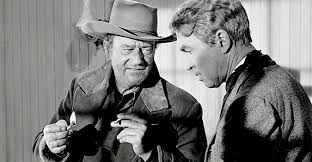
Image courtesy: Once upon a trie in Western.
Directed by John Ford,” The Man Who Shot Liberty Valance” is a classic Western that delves into the legend and tradition of the American West. In this film, Wayne plays the part of Tom Doniphon, a horsewoman who becomes entangled in a conflict with a notorious outlaw. Wayne’s depiction of Doniphon is nuanced and important, adding depth to the film’s disquisition of justice and morality.
John Wayne was more than just an actor; he was an American icon. His portrayal of rugged, heroic characters made him a symbol of American masculinity and patriotism. Despite his controversial political views, his talent and charisma continue to captivate audiences to this day. John Wayne will always be remembered as one of the greatest actors in the history of American cinema.
FAQ's
“Fill your hands, you son of a bitch!” from (1969) the film True Grit, is the most famous line of John Wayne.
John Wayne left behind six figure sum to his first wife and his seven children from first wife.
Wardell Edwin Bond was John Wayne’s close friend.
Stomach Cancer caused the death of John Wayne on June 11, 1979, at the ICLA Medical Center in Los Angeles. he was 72.
